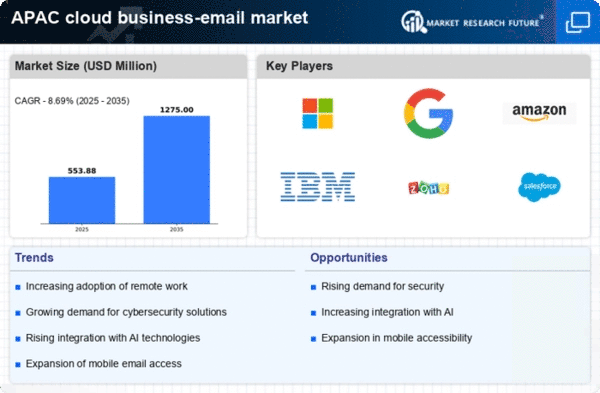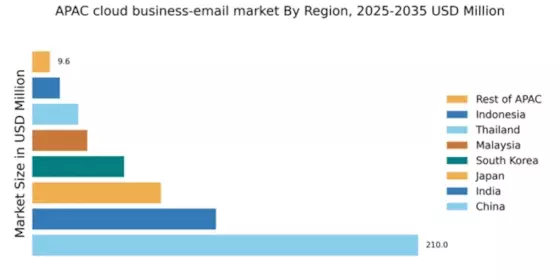China : Unmatched Growth and Innovation
China holds a commanding market share of 210.0, representing a significant portion of the APAC cloud business-email market. Key growth drivers include rapid digital transformation, increasing internet penetration, and a burgeoning e-commerce sector. Government initiatives like the Digital China strategy are fostering innovation, while robust infrastructure development supports demand for cloud services. The regulatory environment is becoming more favorable, encouraging foreign investments and partnerships.
India : Tech Adoption Fuels Market Growth
India's market value stands at 100.0, driven by a young, tech-savvy population and increasing adoption of cloud solutions across various sectors. The government's Digital India initiative is a significant catalyst, promoting digital literacy and infrastructure development. Demand for cloud business-email services is surging, particularly among SMEs, as they seek cost-effective communication solutions. Regulatory frameworks are evolving to support data protection and privacy.
Japan : Balancing Tradition and Innovation
Japan's cloud business-email market is valued at 70.0, characterized by a mature landscape with specific consumer preferences. Key growth drivers include the need for enhanced cybersecurity and compliance with stringent data protection laws. The government is promoting digital transformation through initiatives like Society 5.0, which encourages the integration of advanced technologies. Demand is particularly strong in sectors like finance and healthcare, where data security is paramount.
South Korea : Innovation Meets Consumer Demand
South Korea's market value is 50.0, supported by a highly connected population and advanced technological infrastructure. The government is investing in smart city initiatives, which are driving demand for cloud services. Local businesses are increasingly adopting cloud-based email solutions to enhance productivity and collaboration. Major players like Microsoft and Google have a strong presence, catering to both enterprises and SMEs in urban centers like Seoul and Busan.
Malaysia : Government Support and Growth Potential
Malaysia's cloud business-email market is valued at 30.0, with significant growth potential driven by government initiatives like the Malaysia Digital Economy Blueprint. The increasing adoption of cloud solutions among SMEs is a key trend, as businesses seek to improve operational efficiency. Regulatory support for data protection and privacy is also enhancing market confidence. Infrastructure development in urban areas like Kuala Lumpur is further facilitating growth.
Thailand : Digital Transformation in Progress
Thailand's market value stands at 25.0, with a growing demand for cloud business-email services driven by digital transformation efforts across various sectors. The government is promoting initiatives to enhance digital literacy and infrastructure, which are crucial for market growth. Key cities like Bangkok are witnessing increased adoption of cloud solutions among businesses. Major players are focusing on localized services to cater to specific market needs.
Indonesia : Emerging Digital Economy
Indonesia's cloud business-email market is valued at 15.0, reflecting significant untapped potential. The rapid growth of the digital economy, fueled by a young population and increasing internet access, is driving demand for cloud services. Government initiatives aimed at improving digital infrastructure are crucial for market expansion. Key cities like Jakarta are becoming focal points for cloud adoption, with local and international players vying for market share.
Rest of APAC : Varied Market Dynamics Across Regions
The Rest of APAC market is valued at 9.6, showcasing diverse opportunities across different countries. Each nation presents unique challenges and growth drivers, influenced by local regulations and market maturity. Emerging economies are increasingly adopting cloud solutions, while developed markets focus on enhancing security and compliance. The competitive landscape varies significantly, with local players often dominating in specific niches, while global giants like Microsoft and Google maintain a presence.

















